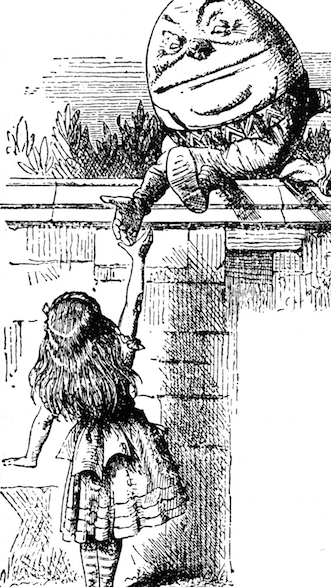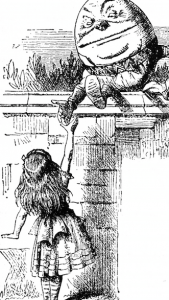I dreamt there’d been an election and that this time we were all out of the rabbit hole and away from the Mad Hatter and his tea party, but I woke, alas, to the reality that the slithey toves were still gyring and gimbling in the wabe. Sigh!
Central to this realisation of mad reality is the impending amendment to the Education Act. Steven Joyce, in his role as Minister of Tertiary Education, is planning to introduce changes to the Education Act that he says will enforce governance changes to University councils which will “strengthen university & wānanga governance” and allow NZ Universities to compete internationally. At first glance it all sounded a bit, well, boring really. Councils, governance, monthly meetings…yawn! But……. And here’s the tricky thing with words, he can say that and, make the words sound sensible and good, but this law change, which is due for its first reading this month, is not really what it seems.
Universities and Wananga are governed by The Council. The membership of council typically includes the Chancellor, the Pro-Chancellor, the Vice Chancellor (who oversees the day to day running of the University) and staff, student, and alumni representatives along with 4 government appointed members. Amongst other changes, this new legislation would restrict the number of council members from the current 12 – 20 down to 8 – 12. So, seems like streamlining. But, and it’s a big but, one thing that won’t change, according to the Minister’s announcement, is the number of government appointees. And exactly how many is that? Each University or Wananga council currently has 4 government appointed members. So, 4 of 20 is 20% or one fifth. But in the new-look council, 4 of 8 is 50% or one half. Half?? Wouldn’t that rather change the discussion and outcome of a council meeting? There is no way it couldn’t.
And what of the remaining 4 – 12 council members who would no longer be there? These are the staff, student, academic, and alumni representatives: The representatives of the University community who will no longer be guaranteed representation. So this law change will give central government a hugely increased control over our tertiary institutions. But the biggest casualty of this, and the ultimate result of lack of university community representation, will be academic freedom. Academic freedom is the Reason for the existence of universities. Without it tertiary institutions are but training institutions, not being derogatory here, we need training institutions too, but the academic freedom of a University or Wananga is the lifeblood of the institution. The role a University has in civilized society has academic freedom at its very heart. Academic freedom is not just enshrined in law, Section 161 of the act (Academic freedom) says:
(1) It is declared to be the intention of Parliament in enacting the provisions of this Act relating to institutions that academic freedom and the autonomy of institutions are to be preserved and enhanced.
Enhanced? How does dramatically increasing the proportion of government appointees on a university council preserve a University’s freedom and autonomy, let alone enhance it?
Now, Steven Joyce knows about words. He has a pre-Ministerial life in media. So it’s hard not to see this as a Humpty Dumpty proclamation:
“When I use a word,” Humpty Dumpty said (to Alice), in rather a scornful tone, “it means just what I choose it to mean — neither more nor less.”
So enhance and strengthen means what exactly? Because it’s hard to see that reducing the input from the community that support of the very reason for a University’s existence is actually a process of strengthening and enhancing. The Minister has not yet explained how reducing the number of council members will strengthen and enhance governance, let alone make our Universities more competitive internationally. Professor Roy Crawford, chair of Universities NZ which represents our 8 Universities has said: “The world’s leading universities have councils that are larger than company boards and are not based on a business model. This is a strength, not a weakness. They recognise that it is essential to have a wide range of viewpoints and perspectives to inform and enrich their decision making.”
Are you feeling uncomfortable yet? You should be. Because whether you have ever or would never attend university what is at stake here is individual and academic autonomy and freedom. It is about freedom of thought. Not only enshrined in the UN charter of human rights (Article 19 – Freedom of thought and opinion), it is fundamental to the structure of our society. The only place the government has at the council table is to oversee appropriate management of the proportion of the finances they contribute – they should NEVER have control over the council.
What is creepily insidious about this proposed change though is its silent, stealthy progress. The Education Amendment Act which will change how University councils are composed, with the ensuing changes and threat to academic freedom, should be front page news. But it’s not. Steven Joyce, I’m guessing, would like nothing better than to have this legislation slide silently into law. This cannot be allowed to happen. This law encapsulates this current government’s cynical attitude to rights and freedoms and symbolizes the dangerous path we are currently headed down. This law is about much more than how many glasses need to be put next to the water jug at the council table once a month. This law is about academic freedom and independence from government interference. This law cuts at the foundation of civilized society. This attempted law change needs to be seen for the control-grab that it is. It needs to be stopped. It needs to be an election issue.
Personally, I don’t think Steven and John use words like strengthen and enhance when they’re chatting about changes to university councils over a cold one. I think Steven is being tricky with words and talking up the changes when words like eviscerate, subjugate and kneecap would be more accurate. Interestingly, when Alice challenged Humpty Dumpty about whether he could change the meaning of words when he felt like it his response was:
“The question is, ‘which is to be master — that’s all.’”
Alice from Wonderland
PS. I’d like to acknowledge the fantastic (still) illustrations of John Tenniel who continues to illustrate my adventures.
Alice works inside the Education sector and wouldn’t want to be identified because this Government responds negatively to dissent.







Excellent article, thank you. I think you really hit the nail on the head here.
It is clear that when National see black they say “oh its white” and when it is raining out side they say “Look, it is sunny”.
When you hear ‘strengthening’ or ‘streamlining’ from National be very worried and please replace such doublespeak with words such as ‘weakening’ and ‘bastardising’.
I would add one additional statement to this article by extending your statement to:
The academic freedom of a University or Wananga is the lifeblood of our society
All mimsy were the borogoves,
And the mome raths outgrabe
Beware the Jabberwock, my son!
The jaws that bite, the claws that catch!
Beware the Jubjub bird, and shun
The frumious Bandersnatch!
Walter Scott had a method behind learning of the madness Carroll offered.
If we look to the USA universities are being taken over by corporate interest.
Academic research restricted to channels and outcomes suited to political and business beliefs.
The Bandersnatch is reaching across the Pacific.
John, that is EXACTLY what Steven Joyce announced yesterday. As Alice says: a definite move to turn Universities into training institutions!!
Slithey Joyce .
http://www.alternet.org/corporate-accountability-and-workplace/chomsky-how-americas-great-university-system-getting?paging=off¤t_page=1#bookmark
slithey Humpty Dumpty Joyce (take another look at the illustration!)
Really interesting link John, and profoundly disturbing. So while the left have been busily distracted about extracting equality and equity and combating poverty within neoliberal control, them what make the rules have been busily lowering expectations across the board = the unenlightenment.
This excellent piece relects accurately the current state of play in education and the essential place universities play in enlightening young and not so young students about social and economic oppression via freedom of thought and speech, the very basic human rights and freedoms this amendment appears to seek to curb. Well said writer,, thank you.
Comments are closed.